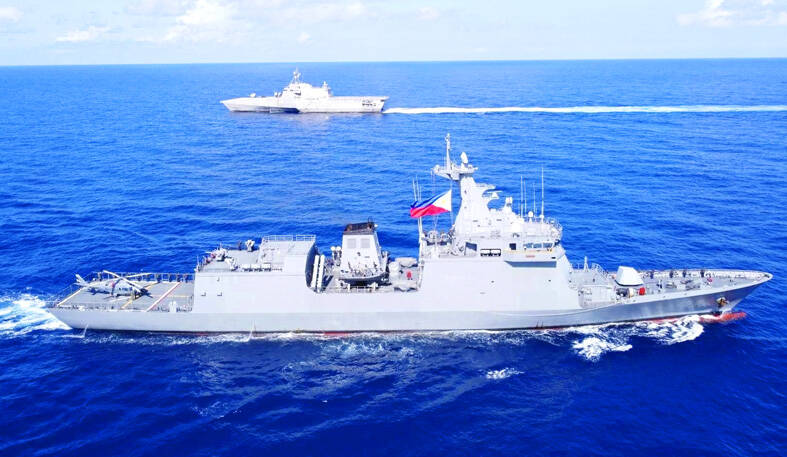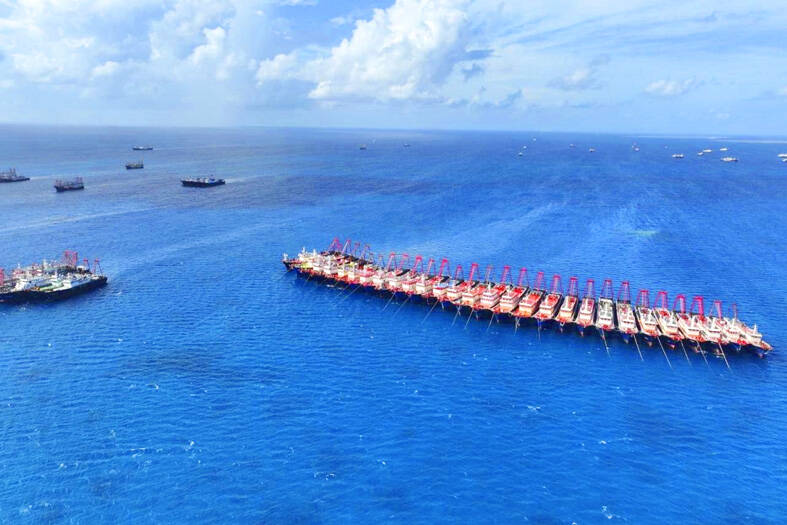The Chinese military yesterday accused a US naval ship of “illegally intruding” into waters near the Second Thomas Shoal (Renai Shoal, 仁愛暗沙), the site of a hot territorial dispute between China and the Philippines in the South China Sea.
A Chinese naval force was mobilized to track the USS Gabrielle Giffords during the operation, a statement from the Chinese People’s Liberation Army Southern Theater said.
The US Navy’s 7th Fleet said the ship “was conducting routine operations in international waters ... consistent with international law.”

Photo: AP
Chinese and Philippine naval and coast guard ships have confronted each other repeatedly around the shoal in the Spratly Islands (Nansha Islands, 南沙群島) in recent months as China tries to prevent the Philippines from resupplying and repairing a rusting warship that it intentionally ran aground in 1999 to serve as a military outpost.
Dwarfed by China’s military might, the Philippines has sought the US’ help in its multiple territorial disputes with China in the South China Sea.
Philippine President Ferdinand Marcos Jr agreed to an expansion of the US military presence in the country early this year and launched joint sea and air patrols with the US late last month.

Photo: AP
China accuses the US of meddling in waters far from its shores and renewed its charge that Washington is the one raising regional tensions following the sailing of the USS Giffords near Second Thomas Shoal.
The ship is a littoral combat ship designed to operate in coastal areas.
“The US deliberately disrupted the situation in the South China Sea, seriously violated China’s sovereignty and security, seriously undermined regional peace and stability, and seriously violated international law and basic norms governing international relations, fully demonstrating that the US is the biggest threat to peace and stability in the South China Sea,” the Chinese statement said.
China has staked claim to virtually all of the reefs and other outcroppings in the South China Sea, building some into islands with runways that could be used by its military.
Taiwan, Vietnam, Malaysia and Brunei also say they are the rightful owners of territory in the same waters in a complex web of overlapping claims.
A statement from the US Navy’s 7th Fleet, based in Japan, said its operations in the South China Sea demonstrate a commitment “to upholding a free and open Indo-Pacific region where all nations, large and small, are secure in their sovereignty, can resolve disputes without coercion, and have the freedom to navigate and fly consistent with international laws, rules and norms.”
The Philippine Coast Guard on Sunday said that it had sent two ships to Whitsun Reef (牛軛礁), another disputed territory in the Spratly Islands, to challenge and document what it estimated to be more than 135 Chinese vessels massing in the area. The Philippines called them a maritime militia and said their presence is illegal. The vessels did not respond to radio challenges, the coast guard said.
China, as in similar incidents in the past, said the reef belongs to China and that the nearby waters are an important operating area and shelter for Chinese fishing boats.
“It is reasonable and lawful for Chinese fishing boats to operate and take shelter in the waters,” Chinese Ministry of Foreign Affairs spokesman Wang Wenbin said. “The Philippine side should not make irresponsible remarks about that.”

The CIA has a message for Chinese government officials worried about their place in Chinese President Xi Jinping’s (習近平) government: Come work with us. The agency released two Mandarin-language videos on social media on Thursday inviting disgruntled officials to contact the CIA. The recruitment videos posted on YouTube and X racked up more than 5 million views combined in their first day. The outreach comes as CIA Director John Ratcliffe has vowed to boost the agency’s use of intelligence from human sources and its focus on China, which has recently targeted US officials with its own espionage operations. The videos are “aimed at

STEADFAST FRIEND: The bills encourage increased Taiwan-US engagement and address China’s distortion of UN Resolution 2758 to isolate Taiwan internationally The Presidential Office yesterday thanked the US House of Representatives for unanimously passing two Taiwan-related bills highlighting its solid support for Taiwan’s democracy and global participation, and for deepening bilateral relations. One of the bills, the Taiwan Assurance Implementation Act, requires the US Department of State to periodically review its guidelines for engagement with Taiwan, and report to the US Congress on the guidelines and plans to lift self-imposed limitations on US-Taiwan engagement. The other bill is the Taiwan International Solidarity Act, which clarifies that UN Resolution 2758 does not address the issue of the representation of Taiwan or its people in

DEFENDING DEMOCRACY: Taiwan shares the same values as those that fought in WWII, and nations must unite to halt the expansion of a new authoritarian bloc, Lai said The government yesterday held a commemoration ceremony for Victory in Europe (V-E) Day, joining the rest of the world for the first time to mark the anniversary of the end of World War II in Europe. Taiwan honoring V-E Day signifies “our growing connections with the international community,” President William Lai (賴清德) said at a reception in Taipei on the 80th anniversary of V-E Day. One of the major lessons of World War II is that “authoritarianism and aggression lead only to slaughter, tragedy and greater inequality,” Lai said. Even more importantly, the war also taught people that “those who cherish peace cannot

US Indo-Pacific Commander Admiral Samuel Paparo on Friday expressed concern over the rate at which China is diversifying its military exercises, the Financial Times (FT) reported on Saturday. “The rates of change on the depth and breadth of their exercises is the one non-linear effect that I’ve seen in the last year that wakes me up at night or keeps me up at night,” Paparo was quoted by FT as saying while attending the annual Sedona Forum at the McCain Institute in Arizona. Paparo also expressed concern over the speed with which China was expanding its military. While the US